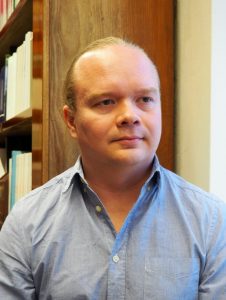Dr. Markus Pantsar

c:o/re Senior Fellow 10/21-09/22
Markus Pantsar is Senior Grant Researcher in Theoretical Philosophy at the Faculty of Arts, University of Helsinki, Finland. In 2017, he received the Title of Docent from the University of Helsinki. His research has focused on empirically-informed epistemology of mathematics. In the recent years, he has moved his focus of research towards computational modeling of cognitive processes involved in mathematics and their complexity. Between 2013 and 2014, he was a Visiting Researcher at the Munich Center for Mathematical Philosophy, Ludwig-Maximilians-Universität München, Germany. His current research project, Epistemology of Mathematics and the Cognitive Foundations of Arithmetic and Geometry, is funded by the Finnish Cultural Foundation. He has published articles in Synthese, Erkenntnis, Minds and Machines, Philosophia Mathematica and Frontiers in Psychology.
Cognitive Complexity and Enculturated Artificial Intelligence
The starting point of my project is that our cognitive abilities are the result of processes of enculturation that transform our basic biological faculties through the cultural transmission of cognitive practices. Human cognitive competences differ between cultures since they are tied to specific cultural practices, making both the ontogeny and phylogeny of human cognitive capacities tied to particular cultural settings. Human intelligence is a social, cultural phenomenon and the theoretical framework we use must be sensitive to the social and cultural factors. In my previous work, I have researched the enculturated development of cognitive capacities when it comes to mathematics. In this project I take the framework of enculturation and apply it to questions of artificial intelligence (AI), simulation and machine learning. While the development of AI is not necessarily aimed at simulating human intelligence, in many applications it is developed in close connection to our best understanding of human cognition. This leads to several fundamental questions concerning the connection between machine intelligence and human intelligence:
- What do we consider to be the kind of human intelligence that we want to simulate with AI?
- How do we account for cultural differences in intelligence (and what is considered to be intelligence) in AI research?
- How should considerations of complexity and computational tractability be included in developing AI and machine learning?
- What is the relation between the notion of computational complexity (relevant to AI) and the notion of cognitive complexity (relevant to humans)?
These types of questions form the foundation for my research project, in which I aim to gain a better understanding of what intelligence is, and how it can be artificially produced.
Publications (Selection)
Pantsar, Markus. 2021. Descriptive complexity, computational tractability, and the logical and cognitive foundations of mathematics. In Minds and Machines, 31(1): 75-98.
Pantsar,Markus. 2021. Cognitive and computational complexity: Considerations from mathematical problem solving. In Erkenntnis, 86(4): 961-997.
Pantsar,Markus. 2021. Objectivity in Mathematics, Without Mathematical Objects. In Philosophia Mathematica, pp. 1-35. doi.org/10.1093/philmat/nkab010.
Pantsar,Markus. 2021. Bootstrapping of Integer Concepts: the Stronger Deviant-Interpretation Challenge (and How To Solve It). In Synthese, 1-24.
Fabry, R. E., & Pantsar, M. 2021. A fresh look at research strategies in computational cognitive science: The case of enculturated mathematical problem solving. Synthese, 198(4): pp. 3221-3263.


